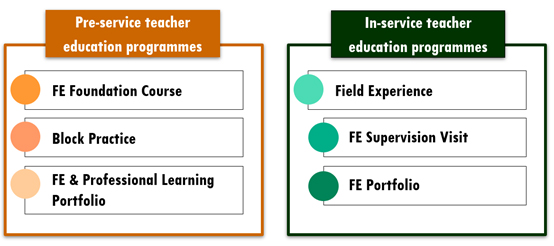學校體驗元素
學校體驗元素
Field Experience Components
FE offers a variety of opportunities for students to integrate their learning from teacher education, demonstrate their competence in various domains, and broaden their understanding of school pupils’ learning and the teaching profession.
The pre-service teacher education programmes consist of three components, FE Foundation Course, Block Practice (BP), and FE and Professional Learning Portfolio. The in-service teacher education programmes focus on Field Experience component which contains the elements of FE Supervision Visit and FE Portfolio.
FE components in pre-service teacher education programmes
FE Foundation Course is a year-long course for students of Full-time BEd programmes, aiming to facilitate students’ early development and adaptation to the changing role of a student to a teacher in Year 2. Students will be guided and supported by a Professional FE Tutor to develop an understanding of the professional standards required of teachers in Hong Kong, and reflect on their personal and professional values and beliefs to establish their teacher identity. Students will also engage in Professional Authentic Context Learning to start their professional dialogues with different personnel in the education sector and be exposed to authentic teaching contexts in their developmental journey towards a professional teacher.
A period of BP provides students with opportunities to teach and to be engaged in life and work of the school. BP is delivered in two parts. i.e., Block Practice I and II (for Full-time BEd programmes) / 1st and 2nd block of teaching practice (for Full-time PGDE programmes). The duration of each BP for students of Full-time BEd programmes is 8 weeks (or one semester, i.e. normally be 13-16 weeks, for students on FE Semester) to build their capacity in working with different stakeholders in schools and experience teaching, enhancing students’ teaching practice experience and adapt to the school environment, and the BP duration in each block for students of Full-time PDGE programmes is 4 and 8 weeks.
| FT BEds | Year 3 Semester II | Year 5 Semester I |
| BP Duration | 8 weeks
(March to May) |
8 weeks
(October to December) or FE Semester: late-August to November |
| FT PGDEs | Semester I | Semester II |
| BP Duration | 4 weeks
(October to November) |
8 weeks
(March to May) |
FE and Professional Learning Portfolio
The two FE and Professional Learning Portfolio courses are offered in parallel with Block Practice I and Block Practice II for students of Full-time BEd programmes in the form of small group tutorials to guide and assess students’ critical and in-depth self-reflection on FE by the Professional FE Tutors. They support students’ active engagement in FE learning in schools and facilitate students to prepare, demonstrate, test, analyse, and reflect on their professional teaching and development through group and individual guidance/consultation.
Students of Full-time PGDE programmes are required to submit a FE Portfolio in each block of teaching practice.
FE components in in-service teacher education programmes
FE Course provides students with an opportunity to develop professional skills in teaching, appreciate the importance of theory-practice synergy in teaching, receive feedback on their professional development as teachers, and reflect on the roles of teachers and schools in education. Students are expected to integrate inputs from Major and Educational Studies courses and develop an effective pedagogical framework for reflecting on and improving their teaching.
FE Supervision Visit is an integral part of the FE course, which normally takes place from November to May. They are arranged to observe and discuss practice in the reality of the student’s unique situation, determine the level of competence of the student, provide meaningful reflection where theory can be examined and practice improved.
FE Portfolio, as part of the FE course, aims to enable students to manage and monitor their learning through keeping record of their learning process and outcomes, and setting learning goals as targets to be achieved. Through creating an e-Portfolio, students can demonstrate their development and achievement in FE and enhance their reflective practice and self-managed learning skills for lifelong learning.




